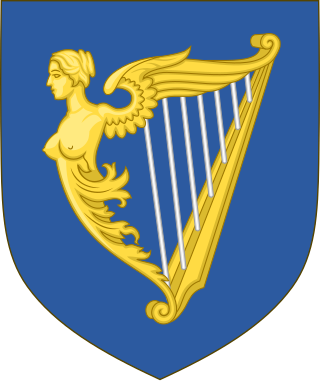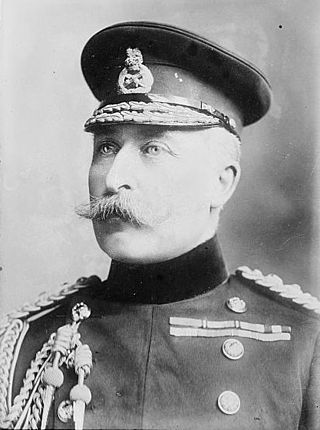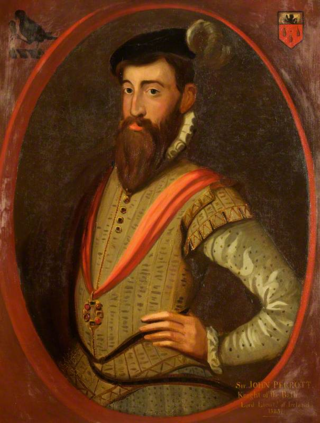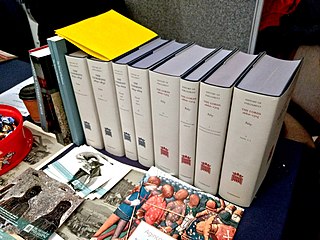Related Research Articles

The House of Lords, also known as the House of Peers, is the upper house of the Parliament of the United Kingdom. Membership is by appointment, heredity or official function. Like the House of Commons, it meets in the Palace of Westminster in London, England.

The Irish House of Commons was the lower house of the Parliament of Ireland that existed from 1297 until 1800. The upper house was the House of Lords. The membership of the House of Commons was directly elected, but on a highly restrictive franchise, similar to the unreformed House of Commons in contemporary England and Great Britain. Catholics were disqualified from sitting in the Irish parliament from 1691, even though they comprised the vast majority of the Irish population.
Escheat is a common law doctrine that transfers the real property of a person who has died without heirs to the crown or state. It serves to ensure that property is not left in "limbo" without recognized ownership. It originally applied to a number of situations where a legal interest in land was destroyed by operation of law, so that the ownership of the land reverted to the immediately superior feudal lord.
Members of Parliament (MPs) sitting in the House of Commons in the United Kingdom are not permitted to resign their seats. To circumvent this prohibition, MPs who wish to step down are instead appointed to an "office of profit under the Crown", which disqualifies them from sitting in Parliament. For this purpose, a legal fiction is maintained where two unpaid offices are considered to be offices of profit: Steward and Bailiff of the Chiltern Hundreds, and Steward and Bailiff of the Manor of Northstead. Although the House of Commons Disqualification Act 1975 lists hundreds of offices that are disqualifying, it is rare for an MP to be nominated to a legitimate office of profit; no MP lost their seat by being appointed to an actual office between 1981, when Thomas Williams became a judge, and 2022, when Rosie Cooper became the chair of an NHS foundation trust.

The Right Honourable is an honorific style traditionally applied to certain persons and collective bodies in the United Kingdom, the former British Empire and the Commonwealth of Nations. The term is predominantly used today as a style associated with the holding of certain senior public offices in the United Kingdom, Canada, New Zealand, and, to a lesser extent, Australia.

Prince Arthur, Duke of Connaught and Strathearn, was the seventh child and third son of Queen Victoria of the United Kingdom and Prince Albert of Saxe-Coburg and Gotha. He served as Governor General of Canada, the tenth since Canadian Confederation and the only British prince to do so to date.
In the United Kingdom, representative peers were those peers elected by the members of the Peerage of Scotland and the Peerage of Ireland to sit in the British House of Lords. Until 1999, all members of the Peerage of England held the right to sit in the House of Lords; they did not elect a limited group of representatives. All peers who were created after 1707 as Peers of Great Britain and after 1801 as Peers of the United Kingdom held the same right to sit in the House of Lords.

William Conyngham Plunket, 1st Baron Plunket, PC (Ire), QC was an Irish politician and lawyer. After gaining public notoriety as the prosecutor in the treason trial of Robert Emmet in 1803, he rose rapidly in government service. He become Lord Chancellor of Ireland in 1830 and served, with a brief interruption, in that post until his retirement in 1841.

Sir John Perrot served as lord deputy to Queen Elizabeth I of England during the Tudor conquest of Ireland. It was formerly speculated that he was an illegitimate son of Henry VIII, though the idea is rejected by modern historians.
Sir John Perrot, was a figure of unusual power and influence in Tudor Britain and Ireland. Born near Haverfordwest in 1528, he inherited wealth and power – the Perrots had been accumulating both in west Wales for centuries – and gained more ingratiating himself with the English court.
His own son described him as a "very cholericke" man, who "could not brooke any crosses". He had already gathered many offices by the time he was sent to Ireland in 1571 as President of Munster to suppress a rebellion. His methods were characteristically violent – he hanged over 800 of the rebels – but he resigned after two years, having failed in his mission.
Back in west Wales he contented himself with self-enrichment and self-glorification, rebuilding in grand style his two main homes, Carew Castle and Laugharne Castle. He returned to Ireland as 1584 as Lord Deputy, with the task of crushing the Irish and colonising their land. Again unsuccessful, he returned, was falsely accused of treason by his many enemies, and died in the Tower of London in 1592, possibly of poisoning.

John Claudius Beresford was an Irish Tory Member of the UK Parliament representing Dublin City 1801–1804 and County Waterford 1806–1811.
Sligo Borough is a former borough constituency in Ireland, represented in the House of Commons of the Parliament of the United Kingdom.

The History of Parliament is a project to write a complete history of the United Kingdom Parliament and its predecessors, the Parliament of Great Britain and the Parliament of England. The history will principally consist of a prosopography, in which the history of an institution is told through the individual biographies of its members. After various amateur efforts the project was formally launched in 1940 and since 1951 has been funded by the Treasury. As of 2019, the volumes covering the House of Commons for the periods 1386–1421, 1509–1629, and 1660–1832 have been completed and published ; and the first five volumes covering the House of Lords from 1660-1715 have been published, with further work on the Commons and the Lords ongoing. In 2011 the completed sections were republished on the internet.
An Inquisition post mortem is an English medieval or early modern record of the death, estate and heir of one of the king's tenants-in-chief, made for royal fiscal purposes. The process of making such inquisition was effected by the royal escheators in each county where the deceased held land. The earliest inq.p.m. was made in 1236, in the reign of King Henry III (1216–1272), and the practice ceased c.1640, at the start of the English Civil War, and was finally abolished by the Tenures Abolition Act 1660, which ended the feudal system.
John Walwayn was an English royal official and scholar, and a proposed author of the chronicle known as Vita Edwardi Secundi a partial record of the reign of Edward II.
References
- Reports from committees. Vol. 12. 1894.
- Parliament Commons, Lists (1879). Return of the names of every Member returned to serve in each Parliament. Vol. Part II.